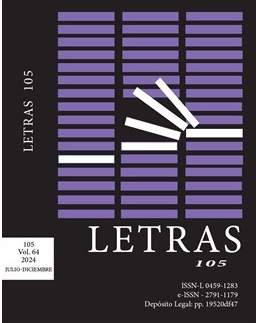Léxico de la gastronomía paraguaya en la novela Hijo de la revolución
DOI:
https://doi.org/10.56219/letras.v64i105.3284Palabras clave:
gastronomía paraguaya, Hijo de la revolución, diccionario, léxicoResumen
Una obra literaria se erige como una fuente valiosa de información que aborda aspectos culturales, sociales y comportamentales de la sociedad representada en una obra. A través de los personajes, se pueden identificar estas peculiaridades, permitiendo el análisis de las unidades léxicas relacionadas con diversos campos semánticos; por ello, explorar un corpus literario que ponga de manifiesto los hábitos alimentarios y las comidas propias de la sociedad descrita permitirá recopilar un caudal léxico relevante de dichos ámbitos. En esta pesquisa, se espulga la novela Hijo de la Revolución (Barreto, 2019) con el objeto de identificar los términos de la gastronomía paraguaya incluidos en esta y contrastar el registro y la información proporcionada en tres repertorios lexicográficos: el Diccionario de la Real Academia Española (2014), el Diccionario de Americanismos (2010) y el Diccionario del Castellano Paraguayo (2017). Se plantea un estudio exploratorio y descriptivo a través del análisis lexicológico y lexicográfico. Los datos obtenidos evidencian tanto unidades léxicas simples como complejas que se listan en tres microcampos: salados, postres y bebidas; algunas de ellas se asientan en los diccionarios académicos; empero, es el diccionario local el que registra casi la totalidad. Se constata que ciertos alimentos son comunes en otras zonas de América. Se destaca que las denominaciones contienen un alto porcentaje de guaranismos puros, mientras que en los diccionarios estos se adaptan a la ortografía del español. En general, las definiciones muestran ciertas similitudes, así también algunas eluden informaciones clave sobre el plato.
Descargas
Citas
Academia Paraguaya de la Lengua Española. (2017). Diccionario del castellano paraguayo. Servilibro.
Acosta, Y. (2013). La gastronomía en la literatura. The Foodie Studies. Periodismo Gastronómico. https://thefoodiestudies.com/la-gastronomia-en-la-literatura/
Alvar Esquerra. M. (2015). Manual de dialectología hispánica. El español de América. Ariel.
Barreto, M. (2017). Hijo de la revolución. Intercontinental Editora.
Blasques Kaspar, K. (2016). “Gastronimia e literatura na formação da identidade nacional”. En Contextos da Alimentação. Centro Universitário Senac.
Bourdieu, P. (1991). El sentido práctico. Taurus.
Coseriu, E. (1977). Principios de Semántica Estructural. Gredos.
Duranti, A. (2000). Antropología lingüística. Cambridge University Press.
Garrido, A. (1996). El texto narrativo. Síntesis.
González Torres, D. (2012). Folklore del Paraguay. Servilibro.
Krivoshein de Canese, N. y Alcaráz F. (2002). Diccionario guaraní-español/español-guaraní. Ediciones Arte S.R.L.
Lipski, J. (1994). El español de América. Cátedra.
Livieres de Artecona, R. (1931). La cocinera paraguaya. Editorial La Colmena.
Miró Ibars. (2018). Karu reko. Antropología culinaria paraguaya. Servilibro.
Miró Ibars. (2000). Alimentación y religiosidad paraguaya. Chipa pan sagrado. Servilibro.
Real Academia Española y Asociación de Academias de la Lengua Española. (2010). Diccionario de americanismos. Santillana.
Real Academia Española y Asociación de Academias de la Lengua Española. (2014). Diccionario de la lengua española. Espasa.
Reyes, M. (2014). “Las relaciones entre la comida y la literatura: Entre los fogones de la historia”. En Revista de la Sociedad Española de Italianistas. pp. 119-128. Ediciones Universidad de Salamanca. https://gredos.usal.es/bitstream/handle/10366/132396/Las_relaciones_entre_la_comida_y_la_lite.pdf?sequence=1&isAllowed=y
Rivarola Matto, A. M. (2018). Tetãygua rembi’u. Comidas paraguayas con historia. Servilibro.
Velilla de Aquino, J. (2019). Tembiu’u paraguai. Comida paraguaya. Servilibro.
Publicado
Cómo citar
Número
Sección
Licencia
Derechos de autor 2024 LETRAS (Caracas)

Esta obra está bajo una licencia internacional Creative Commons Atribución-NoComercial-CompartirIgual 4.0.
La revista LETRAS conserva los derechos patrimoniales (copyright) de las obras publicadas, que favorece y permite la reutilización de los mismos bajo la licencia CC BY-NC-SA 4.0, por lo cual se pueden copiar, usar, difundir, transmitir y exponer públicamente, siempre que se cite la autoría y fuente original de su publicación (revista, editorial, URL y DOI de la obra), no se usen para fines comerciales u onerosos y se mencione la existencia y especificaciones de esta licencia de uso. Si remezcla, transforma o crea a partir del material, debe distribuir su contribución bajo la misma licencia del original.
Quienes envíen algún trabajo deben adjuntar una carta para solicitar que sea sometido a arbitraje y estudiar la posibilidad de incluirlo en la revista. Asimismo, deben señalar su compromiso para fungir como árbitro en su especialidad, en caso de que sea admitido. Queda entendido que el autor se somete a las presentes normas editoriales. En la carta, deben especificarse los siguientes datos: dirección del autor, teléfono fijo y celular, correo electrónico. En caso, de dos autores o más cada uno elaborará su propia comunicación.















